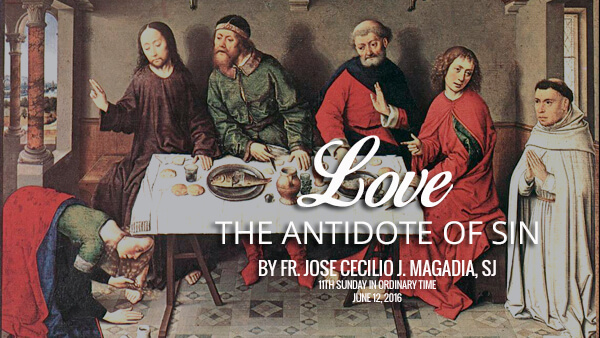


Fr. Jose Cecilio J. Magadia, SJ
11th Sunday in Ordinary Time
June 12, 2016
A sinful woman enters the house where Jesus is, bathes his feet with her tears, wipes them with her hair, kisses them, and anoints them with the ointment.
In response, Jesus makes two statements which are related, yet different. The Lord points out that because of the outpouring of great love, the woman’s sins are forgiven. A second statement then follows which is slightly different: Jesus predicts that she will do even more – that as someone who has been forgiven much, she will thereafter love much more.
Our gospel speaks to us about sin and love. First, it invites us to consider how sin messes up our lives. Second, it compels us to see what love has to do with sin.
First, on sin.
There are many kinds of sin. An obvious typology is built into the Ten Commandments. Then, there also appears an interesting list in the Book of Proverbs (6, 16-19): “haughty eyes, a lying tongue, hands that shed innocent blood, a heart that plots wicked schemes, feet that are quick to run to evil, the false witness who utters lies, and the one who sows discord among kindred.” In the New Testament, St Paul speaks of those filled with every form of wickedness, evil, greed, malice, envy, murder, rivalry, treachery, spite, gossip (Romans 1:29). Many of these are sins of action and attitude. More subtle are those sins of neglect and omission.
At the heart of all sin is selfishness. It is a disorder, because it runs counter to the original order, of who we are at heart, as human beings.
The original order of things is this: that from the very start, we were created as images and likenesses of a god whose first and most natural impulse is to move outward to the other, in an act of loving and giving of self. It is our human nature as well – to be selfless, to be centered on God and on the other. To sin is to move one’s heart away from this.
The other thing that sets in after sin is guilt. It is not sin in itself, but something else, a by-product, like a bad aftertaste. It is that which made Adam and Eve hide after eating the fruit. It is an add-on, based on some kind of fear, because of some wrong done or some good not done well enough. It might be a fear of retribution, or a fear of being blamed, or a fear of being seen by others as being less responsible or less caring or less careful. It is a bad feeling about my self, and slightly different from being compassionate with someone I have hurt.
When guilt becomes so embedded, we fall into the trap of forgetting that forgiveness is gift, not merited, not deserved, not worked for.
When guilt sets in and if we allow it to take over so fiercely, it buries itself so deeply as to paralyze. It is then that we wallow and we are so taken up by ourselves that we are unable to allow ourselves to fall into the unconditional forgiveness of a loving God. We become like the selfish giant of Oscar Wilde, who claims sole ownership of his garden, and keeps away the children. But as the story goes, this also keeps away the spring and the warmth and the flowers and the green. It is an allegory of what happens when we sin. We not only keep others away, we also lock ourselves in, where there is only I and me and mine, and no one else, and my loving heart is not able to be its true self. We might even fall into despair, and so lose life and energy. Then, we might ask ourselves what might be done.
This brings us to the second point: what love has to do with sin.
Love is the antidote of sin. That is what the sinful woman shows when she bathes the Lord’s feet with her tears, and wipes them with her hair – an outpouring of personal love for Jesus. She brings herself back to showing love, and in so doing she tells us that our sinfulness can never take away our capacity to love. It is always there.
Indeed, the more profound response to an awareness of sin is a reaffirmation of who we are in the first place, which sin might momentarily make us forget.
This does not mean that we do not acknowledge responsibility or apologize. We do. But neither do we let ourselves be paralyzed by guilt. We must continue to show our love, and in so doing, heal our sinfulness. As we do so, our sinfulness is conquered, and we awaken ourselves once more to the unconditional forgiveness of God; and our human and natural self which is made to give and to love, flows even more abundantly and becomes even stronger. Because she is forgiven much, she loves even more.
One of the stories re-told by Jesuit Father Anthony de Mello tells of a monk and his disciple who see a scorpion fall into the river. The monk retrieves the scorpion, and as he sets it back on the bank of the river, he is stung by it. A little later, the same scorpion falls in again. The monk retrieves it again, and is stung once more. A third time, the same happens, and the student asks his master why he keeps saving the scorpion which always ends up stinging him. The monk responds by saying, “It is because it is the nature of the scorpion to sting, but it is my nature to save.” So it is with each of us.